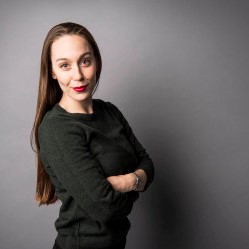
Chloe Angyal graduated from Princeton in 2009 with a degree in Sociology. Originally from Sydney, Australia, she’s now a journalist in New York City, working as the Deputy Opinion Editor at HuffPost where she writes about politics, popular culture, and gender. But before Chloe became who she is today, she had to write a senior thesis. Lucky for us, she had some time in her busy schedule to talk about her experience with independent research:
How did you decide to major in Sociology?
I took my first SOC class my sophomore year — Medical Sociology with Betsy Armstrong — and it blew my mind. It felt like being given x-ray vision, or like seeing a new range of colors. I was looking at phenomena and institutions that I had always thought I understood and seeing them in an entirely new light. It sounds very melodramatic and cliche now, but I felt this world of knowledge opening up to me and it was thrilling.
I had been interested in gender, politics, pop culture and language for a while before arriving at Princeton, and this was one department where all those things overlapped in a way that was interdisciplinary without being too diffuse. That said, the decision to major in SOC wasn’t easy; my parents wanted me to pick something a little more obviously practical. So I applied for Woody Woo, and didn’t get in. Never been so happy to be rejected in my life. I found a way to make the degree practical and useful once I left Princeton, and I didn’t have to give up that addictive feeling I got in my first SOC class, that sense of seeing the world anew.
What was the focus of your thesis?
My thesis was about young women working on Wall Street trading floors, and how the experience of being the one of very few women – and sometimes the only woman – on their teams shaped their behavior at work. A huge number of Princeton kids were taking jobs in finance; a friend and mentor who was two years older than me went to work on Wall Street, and when I listened to her describe how she comported herself at work, it was clear that she was performing gender on the job. I wanted to find out if that was a common experience for women in sales and trading, which is such a male-dominated workplace and such a stereotypically masculine culture. It was a real education in the compromises that people make in the workplace in order to succeed, and how they justify or explain those compromises to themselves and others.
What was the most challenging part of doing independent work at Princeton?
It’s hard to know, going in, how much you’ll be able to get done in a year. I found it very hard with my thesis, and with my JP, to figure out the appropriate scope of inquiry for a 9-month project that you have to balance with 8 classes, extra-curriculars and, one hopes, a social life of some kind. It’s difficult to strike the balance between asking and answering a consequential question that’s worthy of a Princeton thesis, and biting off more than you can chew.
If you could go back and give yourself a piece of advice on independent research, what would it be?
Uh, that the instructor you sass because you’re getting a little too comfortable as a spring semester senior is going to end up being your second reader, so shut your mouth? That’s pretty specific to me and my snarky experience. I would tell 2008 Chloe — and this is something I have to tell 2018 Chloe, too — that you mustn’t be afraid of discovering how much you don’t know. So many times, in my undergraduate thesis and in my doctoral dissertation, I had the sense that I was skimming the surface of a huge body of relevant research and knowledge, but I was afraid to dive in and find out just how huge it was, because then I’d have to do so much more work and I’d have to confront my huge lack of knowledge. It was part laziness and part lack of curiosity, and I regret it now. But you never regret knowing your subject better.
How do you think writing a thesis influenced you academically, professionally, and/or personally?
Writing a senior thesis convinced me that writing a doctoral dissertation wouldn’t be too hard — an outrageous, hilarious, lie I told myself, without which I wouldn’t have my PhD. For some journalists, it helps to be undaunted by dense and borderline unreadable academic journal articles, and my thesis definitely cured me of my fear of those. It was also a great way to practice celebrating small wins and being satisfied with a good day’s work even though you’re far from done. You get to practice working for long stretches without any guidance, feedback or praise and you learn to trust your instincts a little more. Finally, cheesy as it sounds, you get to create new knowledge. You get to contribute something to the store of human knowledge that wasn’t there before, even if it’s a tiny contribution. After an entire education spent absorbing other people’s knowledge, it’s deeply satisfying to be able to add some of your own.
I found Chloe’s experience to be very insightful and hope that you’ve also found comfort in learning about her work with independent research. You can read some of Chloe’s articles on HuffPost or her website.
—Taylor Griffith, Social Science Correspondent

